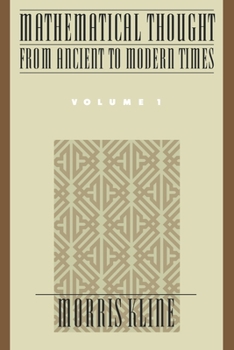Mathematical Thought from Ancient to Modern Times
(Book #1 in the Mathematical Thought from Ancient to Modern Times Series)
Select Format
Select Condition 
Book Overview
This comprehensive history traces the development of mathematical ideas and the careers of the mathematicians responsible for them. Volume 1 looks at the discipline's origins in Babylon and Egypt, the creation of geometry and trigonometry by the Greeks, and the role of mathematics in the medieval and early modern periods. Volume 2 focuses on calculus, the rise of analysis in the 19th century, and the number theories of Dedekind and Dirichlet. The concluding volume covers the revival of projective geometry, the emergence of abstract algebra, the beginnings of topology, and the influence of Godel on recent mathematical study.
Format:Paperback
Language:English
ISBN:0195061357
ISBN13:9780195061352
Release Date:March 1990
Publisher:Oxford University Press
Length:390 Pages
Weight:1.22 lbs.
Dimensions:0.8" x 5.8" x 9.0"
Customer Reviews
3 ratings
pretty good
Published by Thriftbooks.com User , 19 years ago
if flawed. Not only do you have to wade through the gentleman amateur flavour of the first couple of hundred pages or so, but Kline manages to describe William Hamilton as 'the greatest English theoretical physicist after Newton'; even an Irishman would concede that the greatest English theoretical physicist after Newton was Maxwell - Hamilton was third. However with the first impact tremors announcing the approach of Leonard Euler, when the technical issues start to thicken, things improve enormously. Kline is clearly in awe of Euler, and does a good job of communicating why awe is appropriate. It is nevertheless fortunate that the history of mathematics, unlike that of science, is a discipline essentially invulnerable to whiggish prejudice.
Very thorough
Published by Thriftbooks.com User , 22 years ago
As one might expect from a 3-volume history, _Mathematical Thought_ is comprehensive; Kline covers basically all the important mathematical developments from ancient times (e.g. the Babylonians) until about 1930. Note that (as Klein himself mentions) the coverage of ancient mathematics, while taking up a good half of the first volume, is necessarily modest, and if that is the reader's primary interest, s/he would do best to seek out specific histories on the Greeks, Chinese, etc. [Kline gives several useful references, as always].The reader interested in the 18th and 19th centuries will find plenty of food for thought. For example, the story of non-Euclidean geometry is covered well, and Kline does a good job of putting the discoveries in the light of the times. One notable thing I learned is that Lobachevsky and Bolyai were not the discoverers of non-Euclidean geometry, nor were they the first to publish material on that subject. Others before had expressed the opinion that non-Euclidean gometry was consistent and as viable a geometry as Euclidean (e.g. Kluegel, Lambert...even Gauss!) It remained for Beltrami to later show that if Euclidean geometry were consistent, so is non-Euclidean. Of course, important events like the invention of Galois theory are also mentioned. Really, if it's a major mathematical development before 1930, Kline will have it somewhere in these 3-volumes. Incidentally, Kline advances the interesting theory that Lobachevsky and Bolyai somehow learned of Gauss' work on non-Euclidean geometry (which he kept secret and was not learned of until after his death) through close friends of Gauss: Bartel (mentor to Lobachevsky) and Bolyai's father, Farkas. [I understand that this theory has been shown false by recent research into Gauss' correspondence] Kline is careful to indicate it is only speculation by phrasing words carefully, e.g. "might have..." and "perhaps he..." I can appreciate Kline's various speculations and opinions, usually they are very interesting, and (at least in these volumes) he always does a good job of highlighting where the account of history ends and his ideas begins. Even so, luckily for those who like unbiased historical accounts, he inserts himself into the text rarely. This may surprise readers who have read his other books, like _Mathematics: the Loss of Certainty_. This history is a scholarly work, although one can't really say that about his other works.Kline also writes quite a bit about the development of the calculus, as one should expect, given its major role in forming modern mathematics. I got a much deeper appreciation of calculus from reading various sections, which explained how this or that area was influenced or invented because of certain calculus problems.I debated about giving this book 4 stars since there are a few minor flaws. One I've mentioned above; I think Kline should have kept his voice objective, instead of occasionally going into a little diatribe on his pet pe
Bible of mathematical history and thought.
Published by Thriftbooks.com User , 26 years ago
I found the book in college library. It is the best one on math history I have read.





